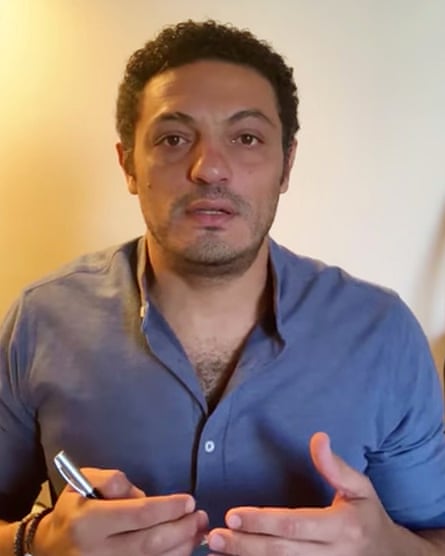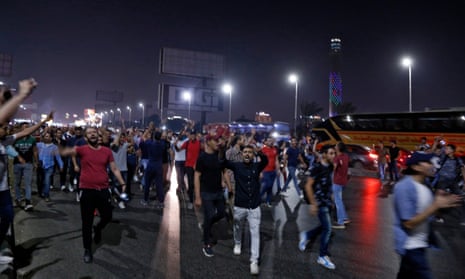Hundreds of protesters have taken to the streets across Egypt since Friday in a rare show of public dissent against Abdel-Fatah al-Sisi’s rule. But the call for demonstrations came from an unlikely source: a contractor and part-time actor living in exile in Barcelona, who has made bold corruption claims in a string of viral videos.
Mohamed Ali is a former military contractor who addresses Egyptians from his apartment, shirt often unbuttoned and cigarette in hand. His colloquial style of speech, sometimes swearing in an accent more working class than his own, is intended to present a man-of-the-people appeal. Ali has called for a million Egyptians to march on Friday.
“You are an oppressor and a failure. The people are starving,” he says, addressing Sisi, who seized power in a military coup in 2013. The video released after protests across the country spliced footage of impoverished Egyptians with that of protests and Sisi laughing, set to dramatic music.

After releasing his first video in early September, Ali got people talking in a way he never did through his acting career. As an extremely rare example of a figure who has benefited from President Sisi’s military regime speaking out against his former paymasters, Ali wasn’t just ready to discuss corruption, but dished the dirt, detailing complex social grievances in Sisi’s inner circle. He claimed the military was squandering public funds, that it owed him 220m Egyptian pounds (£10.8m) as payment for building a luxury hotel, and that Sisi’s wife had ordered costly renovations to opulent presidential palaces.
Ali’s brazen talk of corruption lit the touchpaper of Egyptians’ resentment after years of oppression and austerity. He offered no evidence to back up his claims, but they struck a nerve in a country where 32.5% of the population lives below the poverty line. His eagerness to stir dissent led some to suspect Ali was acting as a front for larger forces, perhaps within the Egyptian state itself. He has also refused any scrutiny from traditional media and ignored multiple requests for comment.
The corruption accusations appeared fanciful until Sisi himself rebutted them in a hastily arranged conference, initially scheduled for later this year. The president’s words did little to soothe the situation. “Of course I have built presidential palaces, and I will build presidential palaces,” he said. “But they are not for me, they are for Egypt.”
Ali’s journey from the middle class Cairo neighbourhood of Agouza to unlikely revolutionary runs through his now-liquidated construction consultancy firm Amlak, which landed lucrative military construction contracts. After partnering with Egypt’s ministry of immigration to produce and star in the film The Other Land, a drama intended to dissuade Egyptians from attempting risky naval migration routes, he walked the red carpet at the Cairo film festival in 2016 flanked by two beefy besuited bodyguards. Tickets for the screening were sold out – because Ali bought them all. His bodyguards prevented journalists from accessing the cinema. The film later bombed at the box office.
“He’s no Omar Sharif – he always plays himself!” said Anwar Sadat, the nephew of the former president and a longtime opposition figure. “He used his contacts to get these military contracts. It shows they [the military] really don’t value or select their partners.”

Sadat, who hails from a family with deep military connections, dismissed any suggestion that Ali might be the face of an internal struggle to unseat Sisi within Egypt’s military. Sisi has overseen a crackdown on political opposition, ordered dramatic reshuffles of top security officials, while officers seen as insufficiently loyal throughout the military and security apparatus have been purged.
Sadat added that the former contractor’s common touch could strike a chord with rank-and-file officers angered at their lack of pay compared to their bosses. “They’re well paid, but still they need more [because] life has become very expensive,” he said. “Then they hear about these millions.”
Ali, who says he fled Egypt for his own safety, has begun broadcasting plans for a post-Sisi government. In a video released on Monday, he said he would hold the Spanish government responsible if he was assassinated.
Mahmoud, a protester who took to the streets of Suez on Saturday night, said of Ali that he was “a thief who had a problem with this thieving government so he decided to shame them”.
Casting doubt on the image of Ali as a puppet-master pulling the strings of protesters in Egypt, Mahmoud added: “It’s possible this was the case with some idiots, but I know very well the government are thieves. It’s my right to participate in protests.”
Adham Youssef contributed reporting
